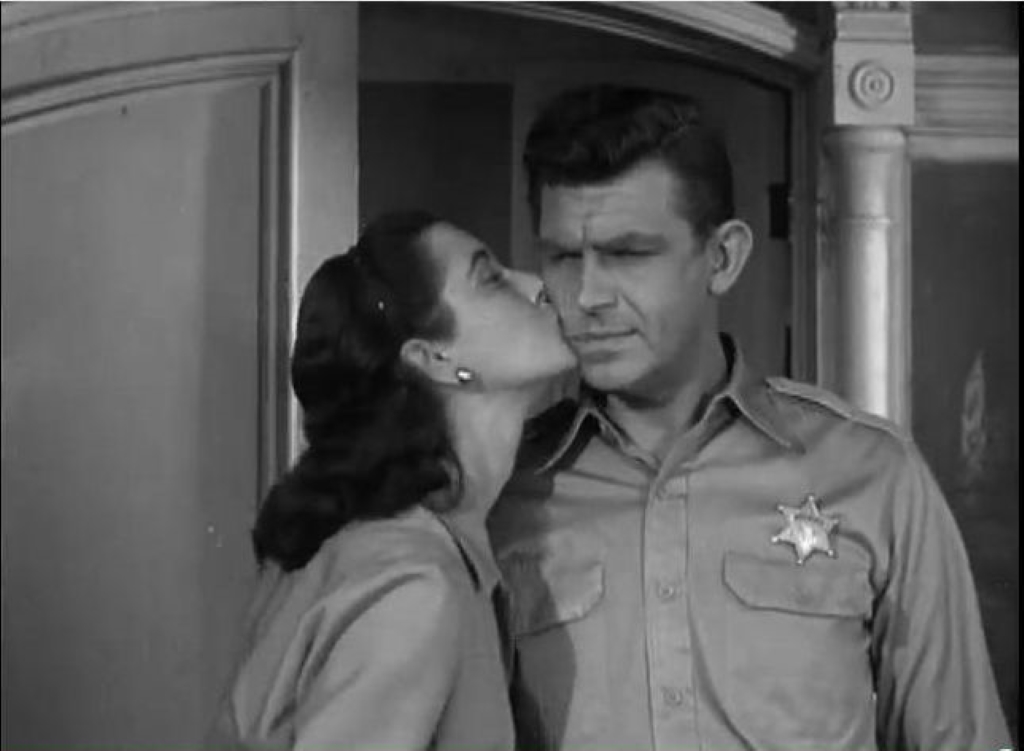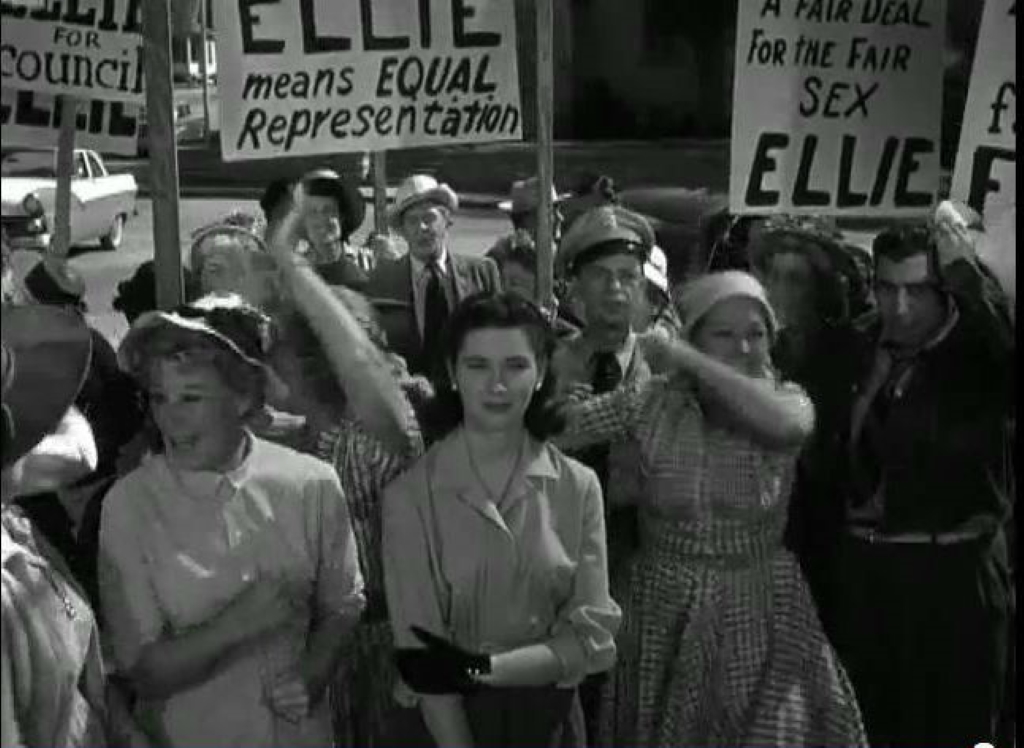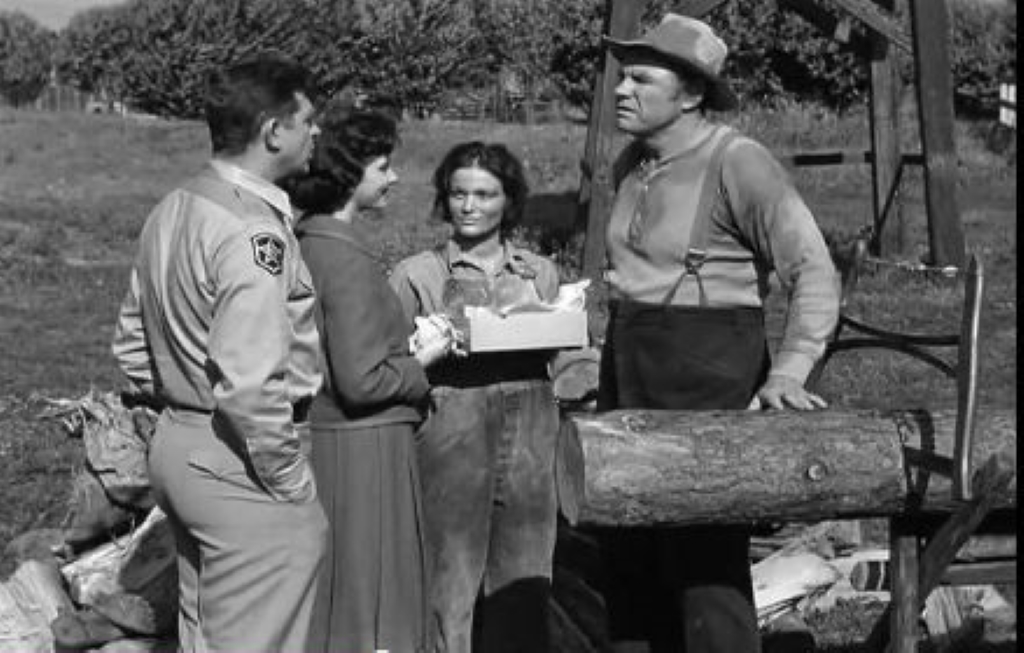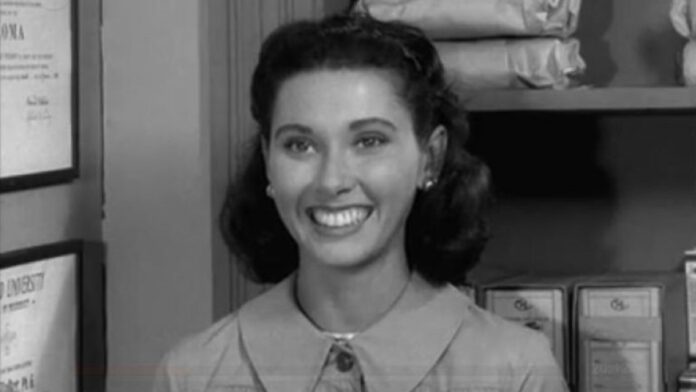The Andy Griffith Show is primarily renowned for offering homespun truths and evoking nostalgia for an idyllic small-town lifestyle that, in reality, is pure myth.
It prided itself on providing viewers with half an hour of sanctuary from the turbulent social and political upheaval of the 1960s.
Consequently, it’s not surprising that the show isn’t widely recognized for groundbreaking depictions of women.
However, even as far back as the first season in 1960, a glimpse of an alternative, almost feminist vision of Mayberry emerges, thanks in large part to the character of Ellie Walker.
Ellie Walker, Mayberry’s first female pharmacist and Andy’s initial love interest makes her debut in episode four, ‘Ellie Comes to Town.’
Portrayed by Elinor Donahue, who had recently concluded a six-year stint as the precocious teenage daughter Betty ‘Princess’ Anderson on CBS’s Father Knows Best, Ellie held significant importance in the show.
In fact, she received billing alongside Andy Griffith, Don Knotts, and Ron Howard in the show’s opening credits—a distinction granted only to her and later to Francis Bavier in 1965 after Knotts’s departure.
Ellie was intended to be an integral part of the series, as evidenced by Donahue initially signing a three-year contract.
However, she appeared in only twelve episodes before requesting to be released.
Consequently, Ellie experienced the Chuck Cunningham treatment and vanished from the show’s narrative without explanation.
Before her disappearance from Mayberry, Ellie stood out as the show’s most audacious character.
She possessed a professional degree (“PH. G.,” as Andy pondered while examining her diploma, “Pharmacy Gal?”) in a male-dominated field—an occurrence that would have been remarkable even in a big city, let alone in a small Southern town like Mayberry.
Ellie had recently graduated from college when she arrived to take over her uncle’s pharmacy due to his illness, and the townspeople were both cautious and amused by the idea of a female pharmacist.
To Mayberry’s credit, it wasn’t Ellie’s gender that perturbed them as much as her newness.
She was perceived as a sophisticated interloper from the big city who didn’t adhere to the Mayberry way of doing things.
Upon learning that Andy accessed the pharmacy when her uncle was absent, Ellie promptly established new rules that didn’t involve self-service.
She aimed to run the pharmacy strictly by the book, even refusing to provide Emma, an elderly hypochondriac, with the medication she had been receiving without a prescription for years.
Right from the start, Ellie set a precedent for challenging the status quo.
By the conclusion of ‘Ellie Comes to Town,’ she eventually relented and allowed Emma to continue her medication without a prescription.
However, her decision was driven by the discovery that Emma’s supposed miracle drug was nothing more than sugar pills.
While the reasons behind Ellie’s initial reluctance to bend the rules were not thoroughly explored, her position as a woman with a job in the medical field in 1960 would have subjected her to higher scrutiny compared to her male counterparts.
Beyond serving as a plot device, her stance in ‘Ellie Comes to Town’ effectively showcased her unwavering integrity—a character trait revisited throughout her tenure.
Once she handed over the pills to Emma, Ellie was embraced as a member of the community, and her courtship with Andy commenced earnestly.
If The Andy Griffith Show were a modern series, the eventual marriage of Andy and Ellie would have been almost a foregone conclusion.
In many ways, they embodied the kind of television couple we’re accustomed to seeing today—complete with mild, teasing sexual tension.
Within the first ten minutes of her inaugural episode, Ellie encountered and befriended Opie Taylor, who informed her that he had no mother—a clear invitation that hinted at her potential role as future Mrs. Andy Taylor right from the outset.

Both Andy Griffith and Elinor Donahue, in later interviews, acknowledged a lack of chemistry between their respective characters, with Griffith primarily shouldering the blame.
Indeed, there was a sense of artificially created chemistry, although they eventually developed a more dynamic connection than what was evident between Andy and his other girlfriends.
Griffith’s discomfort likely stemmed from the significant age gap between himself and Donahue, but the main issue was his lack of confidence in writing for Ellie.
During a comprehensive career retrospective interview with the Archive of American Television, Donahue disclosed that many of her lines were reassigned to Don Knotts because she was deemed ‘not funny.’
At that early stage of the show, no one could have predicted the exceptional chemistry that would develop between Knotts and Griffith.
However, as their on-screen rapport blossomed, the role of Ellie on the show began to wane in favor of the buddy dynamic that existed between the sheriff and his bumbling deputy.
Beyond writing challenges and perceived chemistry issues, there was one major flaw in Ellie’s character design that likely sealed her fate: she posed too much of a challenge for a show that preferred its conflicts to be mild, if present at all.
Ellie served as a constant reminder of the turbulent, changing world beyond Mayberry, which contradicted The Andy Griffith Show’s mission to offer viewers an escape from the messy political and social climate of the era.
This is most evident in episode ten, ‘Ellie Runs for Council.’ The episode did not shy away from feminist themes, though it garnered criticism for including a disturbing domestic abuse joke accompanied by inappropriate canned laughter.
Nevertheless, it stands as one of television’s earliest attempts to address the emerging women’s movement without condescension.
Ellie initially decided to run for a council seat after discovering that no woman in the town’s history had ever held public office.
When she questioned why this was the case, Andy responded, “because one of them might win.”
His stance did not soften upon learning that Ellie intended to run herself; in fact, his reaction was condescending:
Andy: Ellie, it’s not your concern to delve into government matters. You should leave that to the men. Your main focus should be on women’s interests—like shopping, window browsing, trying on hats, enjoying those tiny sandwiches at parties, and engaging in gossip… Do you understand what I’m saying?
Ellie: I understand perfectly. According to you, women should stay within their designated roles and not aspire to think at the same level as men because, in your view, we’re simple-minded fools!
His staunch stance only strengthens Ellie’s determination to win, leading to her campaign inciting a battle of the sexes in Mayberry, with women supporting Ellie and men standing by Andy.
As tensions rise, Ellie reaches a point where she decides to concede the race in order to prevent further division in the town.
It’s at this juncture that Andy becomes aware of the harm his aggressive anti-women rhetoric has caused, especially when he sees that it has influenced his son.
Opie’s cheers celebrating their victory over the females and keeping them in their designated roles, prompt Andy to defend Ellie and openly express his shame over his past behavior.
His heartfelt speech resonates with the townsfolk, resulting in Ellie’s victory in the race.

While her victory might have carried more significance if she had won the race without Andy’s intervention, the fact remains that she emerged victorious, potentially becoming one of the first female characters to hold public office on television.
This moment was not only transformative for The Andy Griffith Show but also held broader implications for television as a whole.
Ellie’s triumph marked a pinnacle for positive female representation within the show. However, following ‘Ellie Runs for Council,’ the series predominantly reverted to reinforcing traditional gender roles.
This regression is most evident in the seventh season episode, ‘Politics Begin at Home,’ where Aunt Bee runs for town councilman, only to discover that she lacks the aptitude for politics.
The last notable episode featuring Ellie was ‘Ellie Saves A Female.’
While it also highlighted Ellie’s independence and feminist principles, it lacked the political resonance of ‘Ellie Runs for Council.’
In this episode, Ellie encounters Frankie Flint, the daughter of a stubborn farmer who prohibits her from indulging in ‘Women Things’ like makeup and dresses, fearing they might divert her attention from farm chores such as log-sawing and animal care.
Ellie becomes entangled in the issue because she witnesses a young woman being deprived of her right to live life on her terms, an injustice too significant for Ellie to ignore.

She persuades Andy to accompany her to the farm, bearing a box filled with makeup and lotion, much to Frankie’s delight.
Her attempt to assist is thwarted by Farmer Flint, who strongly objects to Ellie’s interference.
However, Ellie stands her ground, refusing to back down despite Andy and Flint’s repeated attempts to make her understand that it’s not her concern.
There’s something remarkable about the petite Elinor Donahue facing off against the imposing 6’3″ R.G. Armstrong, who portrayed Frankie’s father.
In those scenes, Ellie displays daring resolve, refusing to be intimidated.
The episode’s ultimate resolution involves Ellie persuading Barney to fetch Frankie from the farm, allowing her to provide Frankie with a makeover and demonstrate how it brings her happiness.
However, the show once again diminishes Ellie’s agency by having Andy’s intervention save the day.
The farmer only relents when Andy points out that his daughter could serve a more valuable role as a potential wife to a capable farmhand rather than as a farmhand herself.
It’s a rather regressive note to conclude on, and it’s highly out of character for the independent and career-oriented Ellie not to take issue with Andy’s suggestion.
Following ‘Ellie Saves A Female,’ Ellie makes just one more appearance before disappearing from the series altogether.
Donahue requested to be released from her contract due to personal reasons related to her divorce from her first husband and exhaustion.
She had been continuously working since childhood, and Griffith did not oppose her decision.
In her interview with the Archive of American Television, Donahue mentioned that if Griffith had asked her to stay, she would have agreed because she “needed to be needed,” but no one contested her choice.
This outcome isn’t surprising. In her twelve episodes, Ellie posed more significant challenges to Andy and Mayberry than many of the opportunistic criminals who would pass through town over the next seven seasons.
She introduced internal, culturally relevant conflicts that didn’t align with the show’s overall tone.
The Andy Griffith Show was never intended to carry the weight of social commentary, and Ellie’s character was crafted for no other purpose.
If they had removed her integrity, outspokenness, and feminist inclinations, nothing substantial would have remained—Donahue was correct in saying she wasn’t funny.
Nevertheless, she contributed something valuable to the show.
After Donahue’s departure, feminist themes occasionally surfaced (most notably in season two’s ‘The Perfect Female,’ where Andy’s date outperforms him), but The Andy Griffith Show settled into its well-known role as a quirky small-town buddy comedy and a tribute to father-son relationships.
It is fondly remembered for that—rightly so—but the first season and Ellie Walker remain intriguing artifacts of the more intricate Mayberry that might have been.
You Might Like To Read: Women In The Box: Ethel Mertz, I Love Lucy


